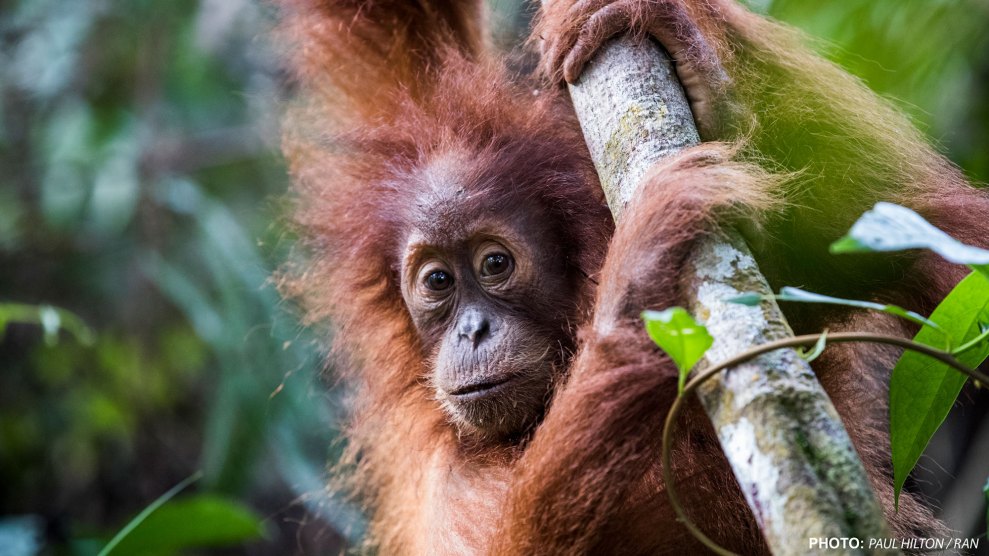
This content was written by Rainforest Action Network, and paid for by Rainforest Action Network; it was not written by and does not necessarily reflect the views of Mother Jones' editorial staff. See our advertising guidelines to learn more.
Fifty years ago, millions of Americans took to the streets, demanding action for the environment—demanding change. The event sparked the modern environmental movement, and what started on April 22, 1970, has now spread around the globe.
Earth Day is at its heart a protest, a rallying cry for our planet and our future, this day and every day. Inspired by that legacy, Rainforest Action Network (RAN) fights for a better future: for thriving forests, a stable climate, and healthy communities.
The threats to each have never been greater.
The world’s forests continue to be burned, bulldozed, and stolen for agricultural and industrial development. We are losing them to greed and quick corporate profits; the local and Indigenous communities on the front lines of expansion are seeing their rights violently disregarded in the process. We lose more tropical rainforests at an alarming rate every day; more than one football field every second. And in the face of a growing climate and ecological crisis, forests have never been more critical to our collective survival. Leading scientists have said, “Our planet’s future climate is inextricably tied to the future of its forests.”
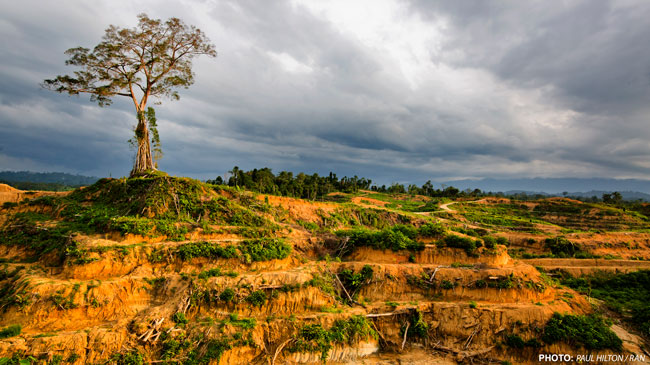
Newly cleared land on a palm oil plantation, PT. Tualang Raya, Aceh Timur, within the Leuser Ecosystem, Indonesia.
Whether you have a forest in your backyard or the nearest one is half a world away, we all depend on forests, and in particular the band of tropical rainforests that circles the Earth at the equator, providing critical local and global benefits. Forests produce our oxygen and rainfall, regulate temperatures, and absorb massive amounts of carbon in the atmosphere—one of the key drivers of climate change—and safely store it underground. Peatland, a type of wetland that develops from and supports many tropical rainforests, is the largest natural terrestrial carbon store in the world. From the cool air we breathe to the clean water we drink, forests are foundational to life. For millions of local and Indigenous Peoples, forests are their homes, sources of livelihood, and religious or spiritual lands. In managing their forests, they ensure the survival of their community and culture.
Lush and primordial, the world’s rainforests are home to most of the planet’s land-based biodiversity—new varieties of plants and animals that scientists are still finding to this day. Forests stabilize the climate, absorb and store greenhouse gases, and maintain global rainfall.
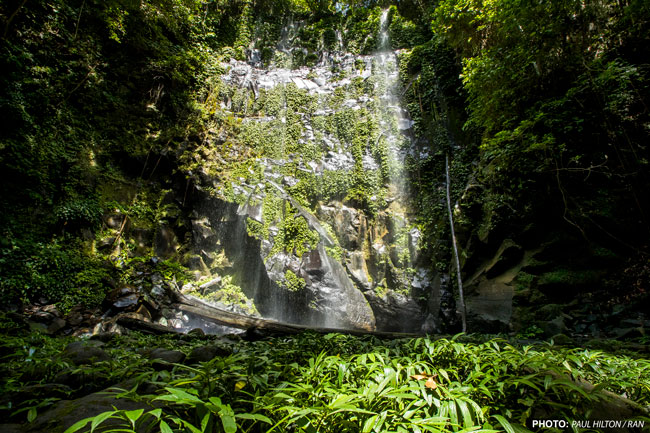
Under the canopy, Soraya District, Leuser Ecosystem, Sumatra, Indonesia.
But rainforests around the world have been cut down for commodities like beef, cocoa, palm oil, paper, pulp, soy, and timber products. Multinational brands provide the market demand for these products, and funding for the destruction flows from major banks worldwide.
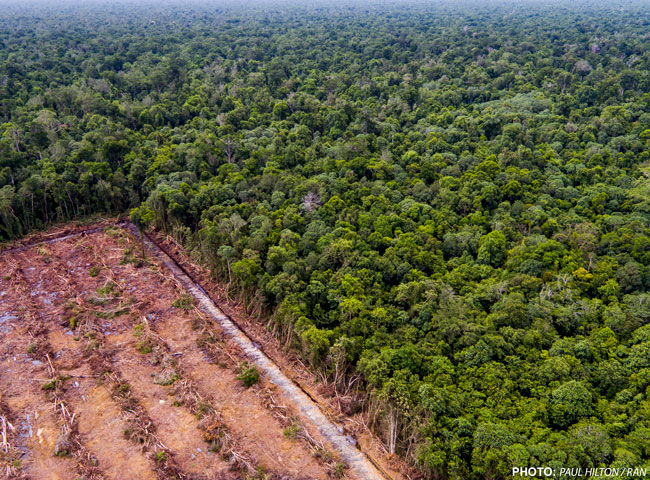
Destruction of the Singkil peat swamp from above, Leuser Ecosystem.
Hundreds of major brands and banks have been pressured over the past decade to make public commitments to stop deforestation and peatland development, and address human rights abuses in supply chains, investments, and financing portfolios. All have missed the mark. And despite collective commitments to center Indigenous Peoples and local communities in any efforts to protect, restore, and manage forests, communities continue to have their rights disregarded, while land and environmental defenders face increasing violence and criminalization. The failure of brands and banks to effectively implement their commitments contributes to ongoing human rights abuses and the growing climate and biodiversity crises.
Indigenous Peoples and local communities have been successfully managing these forests for generations. One of the best defenses against deforestation has long been evident: In a special report on climate change, the Intergovernmental Panel on Climate Change confirmed what Indigenous Peoples and history have long shown to be true: that strong and organized local and Indigenous communities are a key defense against deforestation. And too often Indigenous environmental defenders do so at the cost of their own lives.
Despite only stewarding 22 percent of the world’s land, Indigenous territories protect 80 percent of the planet’s biodiversity. Strengthening the land rights of Indigenous Peoples and local communities has the potential to reduce carbon emissions by 200 gigatonnes by 2050. The UN special rapporteur on the rights of Indigenous Peoples, Victoria Tauli-Corpuz, has said it plainly: “[Indigenous Peoples] have stood as a proven solution to climate change for generations. Recognize our rights, and we can continue to do so for generations to come.”
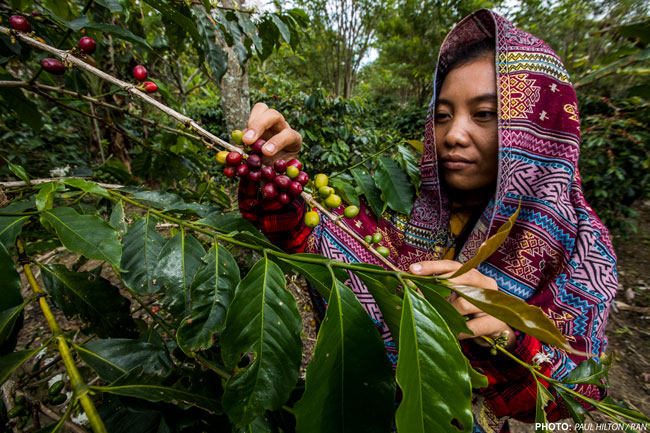
Coffee in the Gayo Lues Permaculture Centre in the Gayo highlands, Leuser Ecosystem, Sumatra, Indonesia.
Rainforest Action Network recently published a report that calls out some of the most influential corporations fueling the destruction of rainforests and the violation of human rights around the world. These 10 multinational brands, seven major banks, and 10 forestry and agribusiness corporations are connected through a web of financial entanglements and together push the destruction deeper into the world’s last stands of rainforest—acre by acre, day by day.
The brands profiled in the report are the multinational, fast-moving consumer goods companies Colgate-Palmolive, Ferrero, Kao, Mars, Mondeléz, Nestlé, Nissin Foods, PepsiCo, Procter & Gamble, and Unilever. The banks are the financial powerhouses Mitsubishi UFJ Financial Group (MUFG), Bank Negara Indonesia (BNI), CIMB, Industrial and Commercial Bank of China (ICBC), DBS, ABN Amro, and JPMorgan Chase. We must hold these brands and banks accountable for the problems they helped create.
The climate is at a perilous tipping point, and the “natural technology” of forests is a critical element of any real solution. Forests and the communities at the frontlines of forest destruction are increasingly under threat. We still have the chance to protect what’s left, but there is no time to waste. We must end deforestation and the expansion of logging and industrial agriculture into the last tropical rainforests in Indonesia, the Amazon, and the Congo Basin, including areas traditionally owned and managed by Indigenous Peoples and local communities.
United as customers and citizens, we’re telling brands and banks that vibrant forests, healthy communities, and a stable climate are worth more than a company’s short-term bottom line. We are demanding that these companies end the destruction of rainforests, the development of carbon-rich peatlands, and the abuse of human rights.
From undercover field investigations to supply chain research, from partnering with organizations on the ground to negotiations in corporate boardrooms, from high-profile media exposure to our dedicated supporters taking action online and in the streets, Rainforest Action Network and our allies successfully call out bad corporate actors and hold them accountable to real and meaningful change. We’re moved to action and determined to fight for the future, in part because on this 50th anniversary of Earth Day, we have no time to lose.
2020 is the year to keep forests standing and respect human rights. Make a gift this Earth Day for our future, and join us in the fight for our forests and our lives.